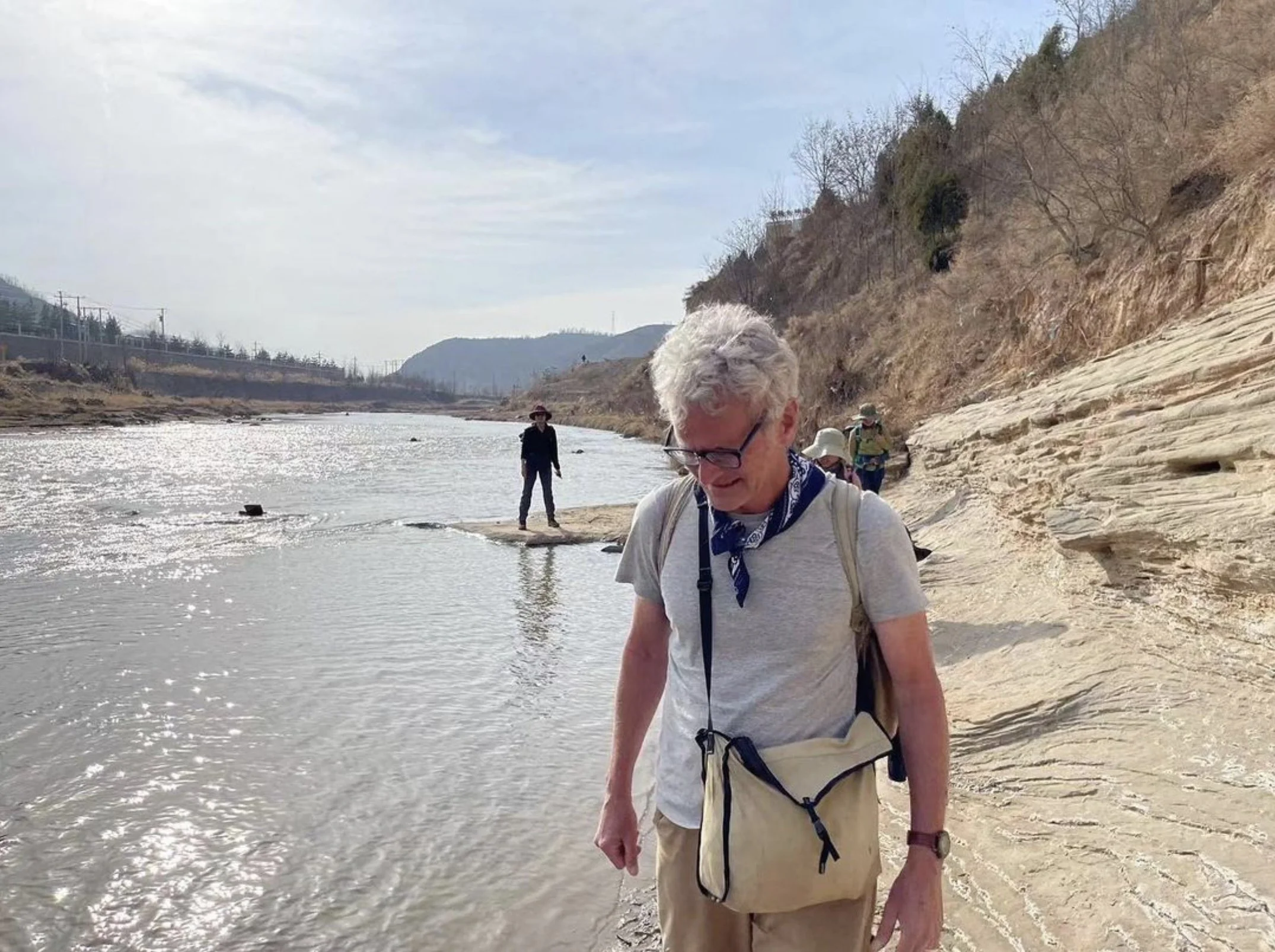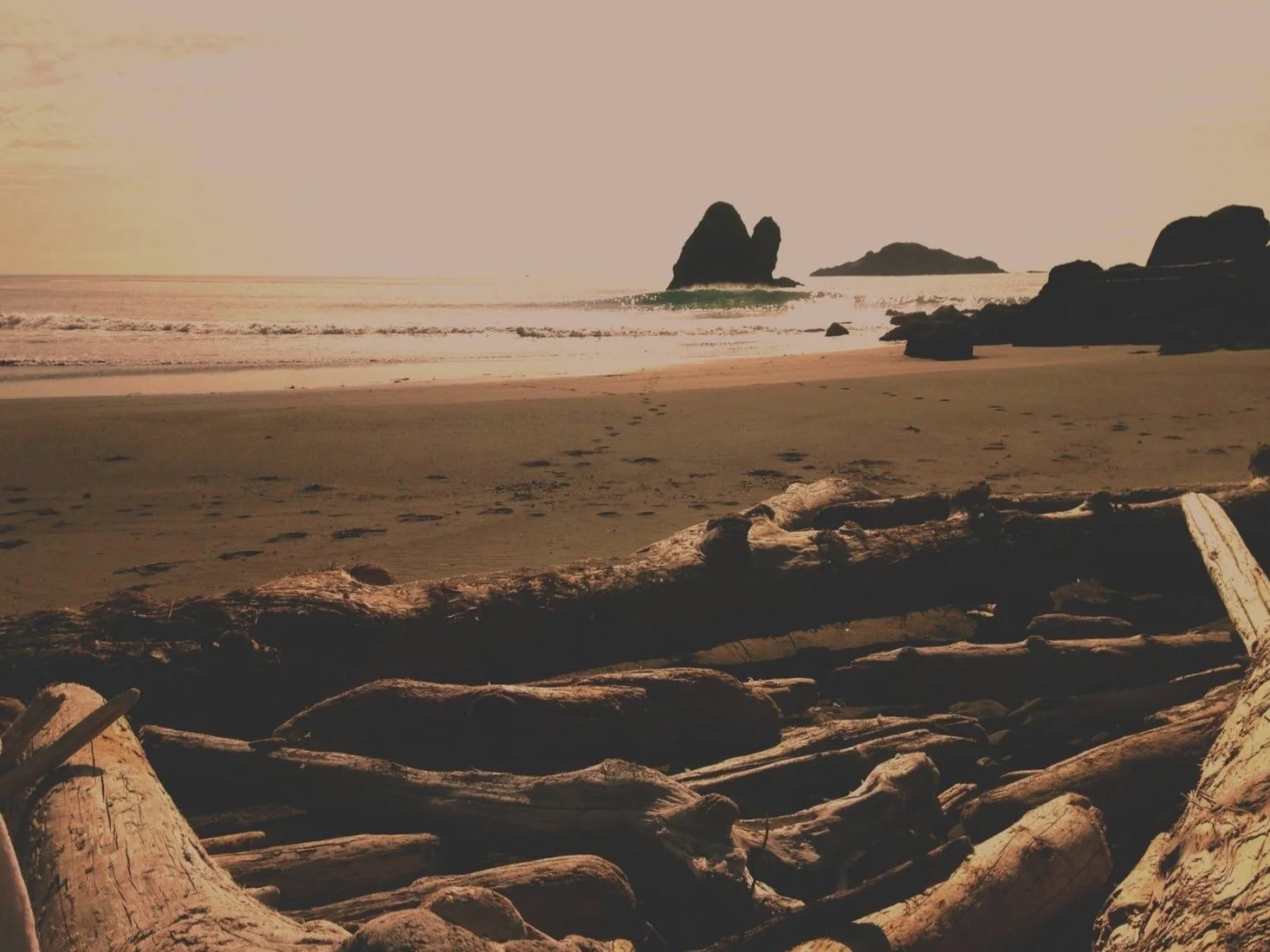The Time We Carry
By Michael H. Kew
In summer you walk often. Walk out to walk in. You carry things.
The solstice carries you.
I carry a white single-fin. From my 47-year-old trapezius hangs a black 28-liter wet/dry bag. Tool for bipedal surf-search. Fitted with tick-blocking pants and day-hikers, 7’0” underarm, I step down through a ferny fen of huckleberry, salal, and wind-sheared spruce to this gap in the south Oregon coast.
Rocky, reefy, curvy. Google Earth porn.
You don’t surf here. Except today. For the first time in two years. Perhaps two decades. Perhaps never. Perhaps never again.
Slow warming Sundazehaze slinks and numbs the afternoon, all soft-focus pastels that blur cirrus into a sea psychedelia.
Dreamtime.
Glass.
Look: gulls and seals and a spouting gray whale. Bobbing bulling kelp lazing in the drift, swaying with the surge, lacing with white ribbons of sea plasma. Depths of coldly fragrant-fresh jade blending with hillside groves. Sky whiffing of salt and soot. Offshore looming of sea stacks and tortured rocks, relics of this coast a billion years old.
My feet and 60,000 years of human pollination reach this beach. Primordial panoramas—beige strip of heavily driftwooded sand, coarse as cracked pepper, cloaked with cliff and forested secret.
By you I am unseen. Publicly private. Ephemeral refuge. Naturalist’s zen. Church of the open sky.
I could be elsewhere.
Paul Salopek "walking the world’s sixth-longest and probably most sediment-laden torrent: the Yellow River in Shaanxi, China." May 2023. Photo: Luo Xin @outofedenwalk
Since Middle Paleolithic Homo sapiens left the Horn of Africa, we’ve walked. All of us. We’ve carried things. Our first portable sheath was likely a pelt quiver for arrows, freeing our hands to hunt and gather. After 45,000 years of peregrination, Alaska was reached and the East Asian pilgrims scattered, launching today’s diaspora of Native Americans from Barrow to Ushuaia. They carried things too.
Bag things: steel bottle, energy bar, hooded five-mil. Modern rucksack gleans roots of 130 years. But in 1991 two German hikers found Ötzi the Iceman in an Italian Alps gully. Arteries split by a foe’s flint-tipped arrow, he died 5,300 years prior, deer-hide quiver and wood frame beside him. Bits of hide and hair suggested a hide sack indeed was stuck to the frame.
Stone Age backpacking, you might say.
Whilst surfing I ponder Paul Salopek, a stranger whose dream I trace. Today he too is backpacking. Carrying things. Things to capture and share his global trek.
“Walking is falling forward,” he told National Geographic a decade yore when the writer first faced the hot wind and dust of Herto Bouri. It was from here he'd launched his 21,000-mile Out of Eden Walk—“a journey that belongs to all of us”—exiting Ethiopia and threading the Middle East and eyeballing the ancient Silk Road, eventually to ford the North Pacific and descend the Americas to Tierra del Fuego, man’s—and Salopek’s—omega.
“(Out of Eden) is a recreation of a journey all of us have made if you just go far back enough in our family trees,” he said. “It’s going to press the boundaries of communicating in a world where there’s too much information and not enough meaning. I’m going to swim upstream against the flow of information and try to slow people down, to have them absorb stories at a human pace.”
Slow journalism.
Salopekinspiration?
Heavy into Year 10 of the Walk, he’s angling through a bewitching China toward the burning beacon of Siberia, last stop before the Bering Strait and the rogue New World. Today’s world.
From his 61-year-old trapezius hangs a communications kit (laptop, camera, notebook, cell/sat phone) so he can “fling open digital infinitudes our nomadic forebears could scarcely imagine…We’ve been wired by natural selection to absorb meaning from our days at the loose-limbed gait of three miles an hour.”
Four-p.m. Sun balms my face. Slouched forward, spent from waveriding, I watch the creep of tide, the diurnal teaser, the surf session killer. The sandbar is dead—fleeting, like us. Estimates claim that 93 percent of all humans to ever live—more than 100 billion—are gone. Soul vapor. Bone dust.
Do you believe in atomic reincarnation?
Five ospreys squeak and twirl overhead—fish too will die. The ancient circle. Wheel of life.
I stand and reposition the bag. Grip the single-fin. Slowly from this beach I step from the past into the present, up through the foyer of rainforest, an old friend, rediscovering it, supplanting memory, carrying things, one age to the next.
Summerdream. Photo: Kew.
“A Handmade World” is Salopek’s latest feature story, National Geographic, July 2023 issue.




